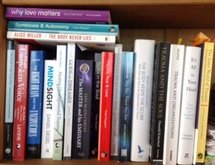 I’ve been engaged in several things this week. I am preparing for our two day workshop in June (www.coachingandtrauma.com), writing a book chapter on Coaching/Therapy boundaries in relation to working with trauma, and writing up my notes from reading ‘In the Realm of Hungry Ghosts’ by Dr Gabor Maté. They are all interweaving in my mind. Often when we talk of trauma, there is a lot of misunderstanding about what trauma is and how it presents. The anxiety levels of practitioners can go up as they contemplate being confronted with a disturbing narrative. As coaches, I do think we have to be able to hear such accounts or we will have all kinds of strategies for making sure we never have to. It is knowing what we do next that matters. More commonly though, in coaching, what we need to recognise and be able to work effectively with, is the shadows of the past in the present Dr Maté’s book is about addiction and comes from his work with drug addicts in Canada. He talks widely abut addiction though, including work addiction, consumer addiction and all the other things many of us realise we are compelled to do. I think of the number of clients I have worked with, and myself, who were desperate for a better ‘work:life’ balance, and yet seemed a victim to the forces that kept them in that place unable to make changes needed to give them the outcomes they wanted. The theme of developmental trauma underlies this behaviour, as addiction, like denial (I am fine, nothing is the problem) are ways we survive internal pain. A typical statement he gives is: “I love whatever I am doing so much I never want to stop”, and”‘so where is all this pain and grief I am supposed to feel?”. Such behaviour is a way of numbing or soothing that pain, but it doesn’t go away and if unaddressed can escalate. He asks a good question: “Could it be that X or Y is serving a function in your life that is helping you endure a situation that would otherwise be making you very unhappy?” Now, jumping back to the chapter on boundaries, is this a coaching question or a therapy question? I think it is both. If we take a premise that coaching is about facilitating the client’s resourcefulness this question seems an entirely valid coaching intervention in raising a possibility which the client can answer or not. It leaves the decision with the client, where it should be. How about this one, from Nancy Kline’s ‘Time to Think’: “What is in your face that you are not facing?” A good question about denial, challenging the ‘everything is fine’ defence. The nature of denial is to make us think that the addiction is actually enhancing our life or making us a ‘good person’. Rescuing is a good example of that too. The other factor about denial is that is prevents us facing the truth of our current situation. The issue for both questions is what do you do next? And are you up to being with what might be said? And if not, what is getting in your way? We need to be able to recognise the shadow of the past and have some appropriate coaching interventions at hand. “A trigger in the present will set off emotions that were programmed perhaps decades ago at a much more vulnerable time in a person’s life. What seems like a reaction to some present circumstance is, in fact, a reliving of past emotional experience” (Dr Maté). We cannot change the past, but we can become aware of how it is triggered and affecting us in the present; for clients and for ourselves. The coaching frame gives us a sound basis on which to shape our responses. The nature of the spaces between sessions, often a month or more; the short term-ness of the contract means that we cannot ‘hold’ someone through a reliving experience of the past. Our focus is the present. Our role is not to diagnose. However, many of the things clients bring to coaching are signs of the past being activated in the present. So often clients in survival behaviour such as denial or addiction or avoidance, pull us out of shape. We talk more, become more directive maybe, bring in more tools and techniques. Or we coach that survival behaviour itself supporting someone to get really good at their work addiction, without fully checking that that is what the client really wants. The questions for us, and which we will engage with over the two days are: “What do we do with a disturbing narrative?” “What are shadows?” “How should we respond?” and “How is my past being retrigged in the present with this client at this time?”. Jules Vaughan Smith 8th May 2017 Reference Maté, G (2008) In the Realm of Hungry Ghosts. Vintage Canada Kline,N (1999) Time to Think.Ward Lock Dr Maté is running a two day workshop in London in May as part of the www.breathoflifeconference.co.uk. The conference is bringing leading trauma therapy practitioners and researchers together. A sample of my trauma reading list: Categories
0 Comments
Your comment will be posted after it is approved.
Leave a Reply. |
Julia's BlogArchives
May 2023
Categories
All
Access Octomono Masonry Settings
|
Becoming Ourselves | Julia Vaughan Smith
© Julia Vaughan Smith 2017-2023 All rights reserved | Privacy Practices | Coaching & Trauma website
Website design by Bright Blue C Design Studio | Photo credits
Website design by Bright Blue C Design Studio | Photo credits

 RSS Feed
RSS Feed